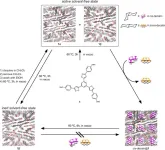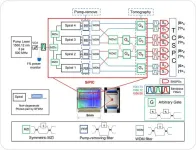(Press-News.org) An international, phase 3 clinical trial led by investigators at Mass General Brigham could improve the treatment of a rare disease that can cause debilitating symptoms. The study, published in the New England Journal of Medicine, found that treatment with inebilizumab greatly reduced the symptoms of immunoglobulin G4–related disease (IgG4-RD), compared to placebo.
“This is a huge day in the history of this disease,” said lead author John Stone, MD, MPH, a rheumatologist in the Division of Rheumatology, Allergy, and Immunology at Massachusetts General Hospital, a founding member of the Mass General Brigham healthcare system. “We are thrilled to have worked so closely with patients to undertake a trial specifically focused on their disease, with the goal of finding a therapy that we hope will be approved shortly for them.”
IgG4-RD is estimated to affect fewer than 200,000 people in the United States. Although IgG4-RD is an orphan disease first recognized to be a unique condition in 2003, review of the medical literature as far back as the late 1800s confirms that the disease was around even then – and likely much longer. People who have the condition suffer from a build-up of immune cells that produce the IgG4 antibody in certain organs. The disease can affect any organ and frequently involves multiple organs, most commonly the pancreas, bile ducts, salivary glands, abdominal tissue, eyes and lungs. The symptoms are driven by which organs are affected. For example, if the disease affects the eyes, it can cause eye swelling and double vision; if it affects the pancreas, the disease can cause pancreatitis and diabetes; and if it affects the bile ducts, it can cause jaundice. Most patients with IgG4-RD have a long diagnostic journey, and many are misdiagnosed as having cancer before the correct diagnosis is established. Some patients even undergo unnecessary surgery prior to the recognition of IgG4-RD.
As with other immune-mediated conditions, patients typically experience recurrent symptoms – disease “flares” – which require immunosuppressive treatment. Doctors have traditionally treated this condition with steroids, but steroid use is associated with multiple side-effects including weight gain, osteoporosis, anxiety, depression, risk of opportunistic infection, and many others. Moreover, people living with IgG4-RD are often especially at risk to doing poorly on steroids, since the disease targets the pancreas in many patients. “When you have a patient who already has an inflamed pancreas that is functioning poorly on that basis and not making enough insulin, the addition of steroids leads to diabetes mellitus in a high percentage of cases,” said Stone. This underscores the important of a new treatment.
In the study, 135 adults with IgG4-RD were randomized 1:1 to receive inebilizumab or placebo. While 40 patients (59.7%) in the placebo group experienced one or more flares, only 7 participants (10%) in the inebilizumab group experienced at least one flare over the year-long study period. This means the drug reduced the risk of flares by 87%.
Inebilizumab, which is manufactured by the study’s sponsor Amgen, is a medication that depletes CD19-expressing B cells, which researchers believe play a key role in IgG4-RD. While highly effective in the trial, inebilizumab can increase infections by depleting B-cells that produce antibodies, and longer-term data will be needed to establish the treatment’s safety profile. The authors note that one of the challenges with B cell depletion therapies is that responses to vaccines may be impaired, which can lead to serious COVID, flu, or other infections. One way to reduce this risk is to ensure that patients are vaccinated before beginning treatment and to use the new therapy prudently, guided by markers of inflammation in the patient’s blood.
Stone and his colleagues have advocated for patients with IgG4-RD for many years. In 2011, Mass General Brigham organized the international symposium focused on the disease. Last year, Stone continued his work building international partnerships across IgG4-RD patients and health care providers by founding the IgG4ward! Foundation, a worldwide advocacy group for people living with this disease.
By raising awareness about the disease, Stone hopes that physicians and patient advocates can improve the diagnosis and treatment of IgG4-RD. “With the publication of this phase 3 trial and greater publicity about the condition, greater awareness will lead to earlier diagnoses, contributing to much better patient outcomes,” Stone said.
Authorship: In addition to Stone, Mass General Brigham authors include Zachary Wallace and Cory A. Perugino.
Disclosures: MITIGATE was designed by several authors and employees of Amgen (sponsor). Stone has consulted for Amgen on IgG4-RD, vasculitis, and steroid toxicity.
Funding: The MITIGATE trial was funded and conducted by Amgen, Inc. All analyses were conducted in a blinded manner.
Paper cited: Stone JH et al. “Inebilizumab for Treatment of IgG4-Related Disease” New England Journal of Medicine DOI: 10.1056/NEJMoa2409712
###
About Mass General Brigham
Mass General Brigham is an integrated academic health care system, uniting great minds to solve the hardest problems in medicine for our communities and the world. Mass General Brigham connects a full continuum of care across a system of academic medical centers, community and specialty hospitals, a health insurance plan, physician networks, community health centers, home care, and long-term care services. Mass General Brigham is a nonprofit organization committed to patient care, research, teaching, and service to the community. In addition, Mass General Brigham is one of the nation’s leading biomedical research organizations with several Harvard Medical School teaching hospitals. For more information, please visit massgeneralbrigham.org.
END
A new multi-national study has revealed that the shape of the heart is influenced in part by genetics and may help predict the risk of cardiovascular diseases.
Researchers from Queen Mary University of London, King’s College London, University of Zaragoza and University College London, as well as Complexo Hospitalario Universitario A Coruña are first to examine the genetic basis of the heart’s left and right ventricles using advanced 3D imaging and machine learning.
Prior ...
The world appears to be plagued by crises.
“The financial crisis, the European debt crisis, the migration crisis, the COVID-19 pandemic, the war in Ukraine, the war in Gaza… The world seems to be stumbling from one existential crisis to the next, barely recovering from one before the next one hits,” said Stefan Geiß, a professor from the Department of Sociology and Political Science at the Norwegian University of Science and Technology (NTNU).
However, are there really more crises now than before?
Has it always been this way, or is something new happening? And if there are more public crises today ...
NEW ORLEANS (November 14, 2024) — A new study from Uganda provides the first evidence to date that resistance to a lifesaving malaria drug may be emerging in the group of patients that accounts for most of the world’s malaria deaths: young African children suffering from serious infections. The study, presented today at the Annual Meeting of the American Society of Tropical Medicine and Hygiene and published in the Journal of the American Medical Association (JAMA), documented partial resistance to the malaria drug artemisinin in 11 of 100 children, ages 6 months to 12 years, who were being treated for ...
If you want to seem sincere and receive more responses to your texts, spell out words instead of abbreviating them, according to new research published by the American Psychological Association.
Researchers conducted eight experiments with a total of more than 5,300 participants using various methods. Across the experiments, individuals who used texting abbreviations were perceived as more insincere and were less likely to receive replies because they were seen as exerting less effort in text conversations. The research was published online in the Journal of Experimental Psychology: General.
“In daily interactions, ...
Highlights:
The Atacama Desert is one of the most extreme habitats on Earth.
Atacama surface soil samples include a mix of DNA from inside and outside living cells.
A new technique allows researchers to separate external and internal DNA to identify microbes colonizing this hostile environment.
This approach for analyzing microbial communities could potentially be applied to other hostile environments, like those on other planets.
Washington, D.C.—The Atacama Desert, which runs along the Pacific Coast in Chile, is the driest place on the planet and, largely because of that aridity, hostile to most living things. ...
About The Study: This study found artemisinin partial resistance in Ugandan children with complicated malaria associated with the Pfkelch13 A675V variation and also found suboptimal 28-day efficacy of parenteral artesunate followed by oral artemether/lumefantrine therapy.
Corresponding Author: To contact the corresponding author, Chandy C. John, MD, MS, email chjohn@iu.edu.
To access the embargoed study: Visit our For The Media website at this link https://media.jamanetwork.com/
(doi:10.1001/jama.2024.22343)
Editor’s Note: Please see the ...
Sometimes the holes, or pores, in the molecular structure of a chemical only appear in the presence of certain conditions or other ‘guest’ molecules. This affects the field of separation—one of the most important processes in industry—but researchers have only just begun to unravel this phenomenon
Researchers have explored how a particular chemical can selectively trap certain molecules in the cavities of its structure—even though in normal conditions it has no such cavities. This innovative material with now-you-see-them-now-you-don’t holes could lead to more efficient methods for separating ...
A group of South Korean researchers has successfully developed an integrated quantum circuit chip using photons (light particles). This achievement is expected to enhance the global competitiveness of the team in quantum computation research.
Electronics and Telecommunications Research Institute (ETRI) announced that they have developed a system capable of controlling eight photons using a photonic integrated-circuit chip. With this system, they can explore various quantum phenomena, such as multipartite entanglement resulting from the interaction of the photons.
ETRI’s extensive research on silicon-photonic quantum ...
Collecting images of suspicious-looking skin growths and sending them off-site for specialists to analyze is as accurate in identifying skin cancers as having a dermatologist examine them in person, a new study shows.
According to the study authors, the findings add to evidence that such technology could help to reliably address diagnostic and treatment disparities for lower-income populations with limited access to dermatologists. It may also help dermatologists quickly catch cases of melanoma, a serious form of skin cancer that kills more than 8,000 Americans a year.
Their new system, which the researchers call SpotCheck, enables skin cancer specialists ...
COLUMBUS, Ohio – Researchers have identified new roles for a protein long known to protect against severe flu infection – among them, raising the minimum number of viral particles needed to cause sickness.
The protein also helps prevent unfamiliar viruses from mutating after they infect a new host, the study found – meaning its absence during an immune response could enable an animal virus spilled over to people to adapt rapidly to human hosts.
The combined findings by scientists at The Ohio State University add up to potential trouble for people deficient in the protein, called IFITM3 – especially if an avian or swine flu were to gain ...

